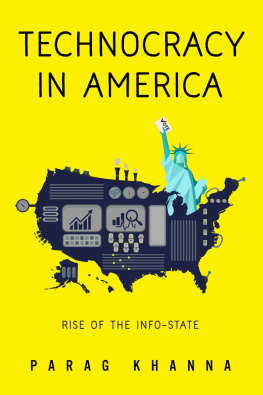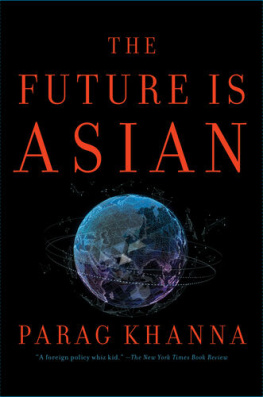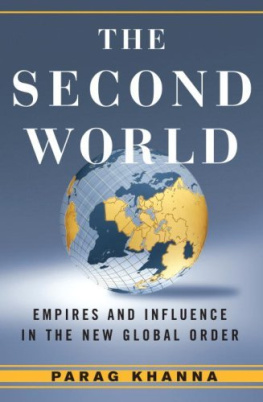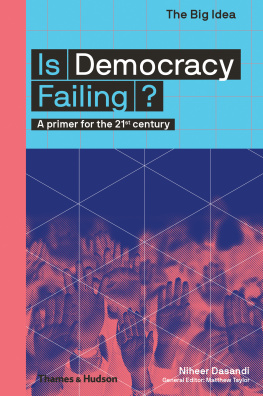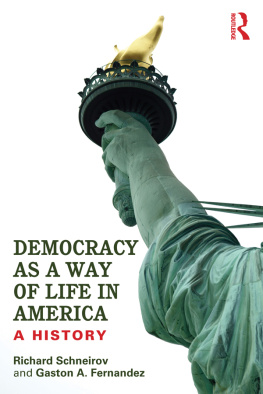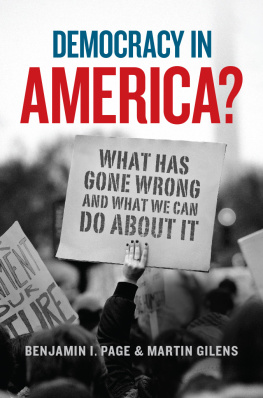ENDORSEMENTS
American democracy is broken. But the best political practices of other countries can fix it. Read this book to find out how!
- Daniel Bell, author of The China Model and Dean, Faculty of Politics and Public Administration, Shandong University
What can America learn from the more technocratic governments in todays world? I dont agree with everything in this book, but it is one of the most important and urgent rethinkings of what has gone wrong in the United States.
- Tyler Cowen, Professor of Economics, George Mason University, and author, Average is Over
Parag Khanna does it again, brilliantly pushing the boundaries of how we must rethink technocracy and democracy in our densely connected, rapidly changing and radically contingent world. And in such a world we will need a new generation of technocrats who are well versed in complexity science and deep listening skills. This book should be read by all of us especially in light of our recent experiences picking our next president.
- John Seely Brown, Former Chief Scientist, Xerox Corporation and Director of Xerox Palo Alto Research Center (PARC)
Parag has produced yet another thoughtful and provocative masterpiece. His insights on technocracy, which focuses on performance rather than politics, stems from an astute and up-close observation of the Singaporean and Swiss systems, and he is among the very few who has this unique vantage point. I would highly recommend this book to anyone who wants to understand how to run a high-performing country or organisation. It will be one of the best investments youll ever make.
- Tan Yinglan, Venture Partner, Sequoia Capital, and author, The Way of the VC
Copyright 2017 by Parag Khanna
All rights reserved.
www.paragkhanna.com
First Edition
ISBN: 978-0-9982325-1-5
Printed by CreateSpace
Print formatting and cover by Distillate
Images on cover used under license Shutterstock.com
Contents
PROLOGUE: THE DIAGNOSIS
Americas 2016 presidential election exposed that its style of democracy is as much a tool of division as unity. Two years of toxic campaigning revealed deep rifts in the nations fabric while providing no common agenda for how to overcome them. Nearly two centuries after Alexis de Tocquevilles ode Democracy in America , its time to admit that America needs less of its own version of democracymuch less.
Over the past decade, Americans have become accustomed to hearing that their position in the global rankings of wealth, life expectancy, education, public safety and other metrics has slid below that of their first world peers. If this wake-up call were not enough, a 2014 Gallup survey found that Americans are not only fed up with the performance of the federal government, but also that they have lost faith in their system of government, with dissatisfaction doubling to 65 percent. The flaw is both in delivery and design. Democracy alone just isnt good enough anymore.
America today far better represents degenerative politics than good governance. Many American intellectuals celebrate the theater of politics as if it is the embodiment of Tocquevilles praise for civic democracy. But democracy is not an end in itself. The greater goal is effective governance and improved national well-being. Because Americans no longer sense collective progress, they dont trust their institutions anymore, whether the White House, Congress, political parties, the Supreme Court, big business, or church. These organs of American leadership are passing down to the next generation a less well functioning government and society rather than the one they need to manage a complex future.
In his recent book Political Order and Political Decay , scholar Francis Fukuyama wonders whether the American system requires some kind of external shock to the political ordersuch as a war or revolutionto jolt itself out of the present downward spiral and return to a focus on performance rather than politics. Perhaps Donald Trump represented just such a shock. By taking the White House, while Republicans retained the Senate and House, Trumps populist revolution led many to fear that he represents a kind of tyranny that no checks and balances can prevent.
Democracy producing tyranny: Plato saw it coming. The ancient Greek philosopher articulated a range of possible regimes from aristocracy to tyranny, with democracy being the penultimate phase of degeneration. For Plato, the essential ingredients for a successful polis were an educated and engaged citizenry and a wise ruling class: Democracy combined with political aristocracy. Democracy with neither of these attributes would be a free but dangerously anarchic society whose lack of discipline made it easily susceptible to tyranny. To ward against such decay, his preferred form of government was led by a committee of public-spirited Guardians. Today we call such a system technocracy . America has more than enough democracy. What it needs is more technocracya lot more.
The way to get there is ideally neither war nor revolutionnor a bout of tyrannybut to evolve Americas political system in a more technocratic direction. Technocratic government is built around expert analysis and long-term planning rather than narrow-minded and short-term populist whims. Technocrats are not to be confused with the complacent establishment elites that were just stunned by Trump. Real technocracy has the virtues of being both utilitarian (inclusively seeking the broadest societal benefit) and meritocratic (with the most qualified and non-corrupt leaders). Instead of ad hoc and reactive politics, technocracies are where political science starts to look like something worthy of the term: A rigorous approach to policy.
Technocracies are more IQ test than popularity contest: The percentage of social mindshare governed by petty politics is far reduced. In technocratic regimes one doesnt hear phrases like learn on the fly or rely on your advisors. They dont indulge in short-term political circus acts such as the First 100 Days. Rather than fact-free debates, data and democracy have equal value in guiding strategy. Technocracies also dont waste time with ideologically stale dichotomies such as big versus small government, but think issue-by-issue about how government can be most useful.
Sound good to you? Youre not alone. The most recent World Values Survey reveals that from World War II to today, the percentage of people in Europe and the US who feel it is essential to live in a democracy has fallen from two-thirds to under one-third. Meanwhile, the proportion of Americans who believe that experts should decide what is best for the country rather than the government has risen from 32% to 49%.
In other words: Americans are craving a better governmentone that balances democracy and technocracy.
Unfortunately, America today suffers from an abundance of representation and a deficit of administration. There is a great excess in the power of representativescongressmen and senatorsand deep shortfall in the power of administratorsgovernors and mayors. There are too many officials trained in law and not enough in policy: In other words, too much time spent arguing rather than doing something. If the same political chaos that brought the Founding Fathers together in 1787 is present today, then it is again time for a new constitutional convention.
This short book is a background memo for that process, a combination of what we know and what we can imagine about designing an effective government that serves the people. The first two sections bring you up to speed on the latest thinking on what constitutes good governance with a spotlight on two countries, one the worlds most genuine democracy and the other the most admired technocracy, as well as a tour of what we can learn from how well these and other small states are run. The latter three sections then apply these findings to construct the ideal 21st century political system for America.

